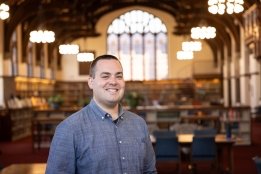Exploring a foraging world on campus

In celebration of Earth Day, Mount Holyoke College welcomed Alexis Nikole Nelson to campus as she demonstrated to students, staff and faculty how foraging is not only good for the environment but also beneficial for one’s health.
Take a walk around the Lower Lake, and in-between saying hello to Jorge and watching all the trees starting to bloom on campus, you’ll discover a wide variety of plant life. Many of these plants are completely edible. This Earth Week, the Miller Worley Center for the Environment at Mount Holyoke College welcomed Alexis Nikole Nelson to campus to discuss the benefits of foraging and to lead walks through campus, demonstrating how the plants found on campus can be used in cooking.
“I really think foraging is not only nourishing for your physical and mental health, but it serves to create this group of people that advocate for the spaces that they’re foraging in,” she said. “A lot of these plants that coevolved with humans for thousands of years often benefit from our interaction. You see plants like sweetgrass disappear in places where humans are not having a relationship with it.”
Known as The Black Forager on social media, Nelson reframes the world of food by using her platform to highlight, sing and celebrate the edible plants hiding in plain sight. As a 2022 James Beard award winner and a Forbes 30 under 30 recipient, Alexis also delves into historical layers on African American and Indigenous food traditions that have typically been repressed.
Nelson’s talk in a packed Hooker Auditorium began by taking the audience through her journey from childhood to adulthood, with her foraging experiences starting in her mother’s garden as she discovered plants and coming full circle during college when she realized that there were a host of edible plants. It was then that she decided to start documenting her foraging finds.
“I was seeing a lot of foraging accounts, but what I wasn’t seeing was anyone who looked like me,” she said.
Foragers have historically faced difficulties throughout United States history, something Nelson highlighted during her talk. Wild gardens filled with forageable plants that had been cultivated over hundreds of years faced destruction from overuse when settlers arrived into the U.S. Years later, following the Emancipation Proclamation, landowners in South Carolina passed criminal trespassing laws to discourage foragers from entering their land.
“These laws … successfully disenfranchised Indigenous and poor people from food sovereignty that they have had for years,” Nelson said.
It wasn’t until after World War II that foraging was brought into a new era with the publication of a book by Euell Gibbons. Foraging was not only seen in a new light but also recognized as a means of preservation. Some plants actually require foraging for survival, something that has happened as they shared a habitat with another species for thousands of years.
The morning following her talk, Nelson led two walks around campus and a cooking demonstration with groups of students and faculty. The walks explored the various wild plant and flower life that call the Mount Holyoke campus home, demonstrating how they can be used in everyday cooking. Nelson also took time to explain how foraging has an impact on the environment.
“Foragers are often some of the first people to notice issues that are going on within the world of plants and fungi because they’re the ones who are on the ground having to pay close attention day after day, month after month, watching the way that things change, whether things are blooming earlier. I know foragers are often the first ones to report on seasons of plants increasingly creeping up as we have milder winters,” she said. “I think when it really comes down to it, foraging, whether you’re just picking a couple of dandelion flowers or going out and making a charcuterie board of acorn cheese, it helps you see this inherent value in the spaces you occupy. When humans see value in spaces, they take better care of them, they want to steward them to the best of their ability and they want to make sure that the people following behind us get the opportunity to do the same.”
Earth Week also brought several other eco-centered events to campus. On April 23, Speed and Sprocket had a mobile shop on Skinner Green to service the bikes of employees and students, getting everyone ready for the spring and summer riding season. On Saturday, April 27, students and faculty from the Miller Worley Center for the Environment joined the South Hadley Tree Commission and others to plant fifteen trees in celebration of Earth Day.
